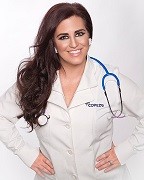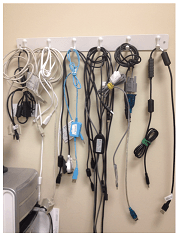
Dr. Jennifer Shine Dyer is a pediatric endocrinologist, social media enthusiast (@EndoGoddess) researcher, blogger at EndoGoddess Musings, and mobile technology entrepreneur at Ohio startup Duet Health and creator of the app, “Endo Goal.” She is focused on implementing engagement platforms with compensated feedback loops for chronic diseases such as diabetes.
Dr. Dyer is a board-certified physician in both Pediatrics and Pediatric Endocrinology previously at Nationwide Children’s Hospital affiliated with The Ohio State University College of Medicine in Columbus, Ohio where she recently earned her MPH degree in health behavior studies.
What are a few aspects of the patient experience that you wish more endocrinologists could learn about?
I am really proud to be a part of the diabetes online community…one of the largest and most active of all online healthcare communities. I wish that endocrinologists would recommend the diabetes online community as an important resource for support and information to their patients. In general, endocrinologists are afraid that the online environment will provide misinformation to their patients. What they don’t understand is that the community itself, particularly when there are a lot of voices involved like the diabetes online community, polices itself with regards to misinformation and mischief by those without the best of intentions. In other words, the diabetes online community is a democracy where the intention is to provide accurate and helpful information to its participants. Thus, endocrinologists should not worry but rather embrace the diabetes online community.
Where are today’s diabetes technologies falling short?
Data management interoperability is a major flaw of all of our technologies currently: no universal cord or software program for each of the glucose meters and insulin delivery devices (pens, pumps) at one time. Furthermore, there are no glucose/insulin/carb data management solutions that allow wireless cloud-based data updates in real-time without manual entry or manual downloads to a central platform. In our clinic alone, we have a huge mess of cords that we must sort out to download data from devices at an appointment…a universal cord would be a start in the right direction so that valuable time at an appointment is not spent trying to locate the right cord.

When working with a patient who is struggling with the demands of diabetes management, how do you as a healthcare provider focus on their emotional state in their life with diabetes and the support that they may or may not be able to find from diabetes technology?
In our clinic, we are constantly trying to find the best ways to support our patients that are struggling. We are always learning and changing our approach as we learn more. However, currently, the first thing we do is listen. Listen to what the patient is saying…or not saying. In other words, what is the biggest problem that they are facing in their life unrelated to diabetes. The first priority is to have each patient create a diabetes goal and to help them to see how that that diabetes goal can help whatever problem that they are having in their life. The second step is to help formulate some easy answers specific to that problem for the next several days that the patient feels that they can be successful at. Finally, if the problem that they are having requires specific psychological support such as in a case of bullying or teasing at school about their diabetes, we have a wonderful psychologist in our office that can see them in conjunction with their diabetes appointment.
What can the diabetes online community do to help alleviate fears of misinformation that endocrinologists have?
Endocrinologists are always listening to the results of studies and improvements in outcomes so anytime the diabetes online community can be studied and improved outcomes published in medical journals, then endocrinologists will eventually lose their fears. In the meantime, all of us in the diabetes online community must continue to inform those who don’t understand about its power and natural policing of information. It’s up to us to keep up the effort until everyone understands.
Thank you, Dr. Dyer!







